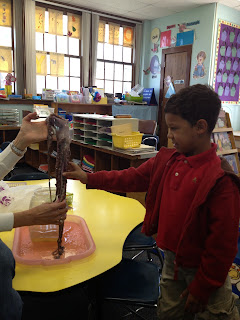 Save The World On Your Own Time (New York: Oxford University Press, 2008). Hardcover, $19.95.
Save The World On Your Own Time (New York: Oxford University Press, 2008). Hardcover, $19.95.Stanley Fish is a crank. An erudite crank, an influential crank, but a crank all the same. Which may be why I was inclined to like
Save The World On Your Own Time, because although we are a different kind of crank, I occasionally found myself laughing and -- even when in strong disagreement -- refreshed to read someone who simultaneously cares deeply about the future of the academy and is willing to challenge us to re-think our key assumptions about our work. Even though I am not as well paid, or as accomplished, as Stanley Fish, I like to think that this blog plays a similar role and that I write in a similarly constructive spirit. Finally, I like him for being married to Jane Tompkins, who once wrote an
engaging and truly wacky book about teaching, and I imagine that they must have a
really interesting life together.
But the truth is that I have never read anything except an op-ed piece by Stanley Fish until yesterday, and that may change.
Fish, a literary and legal scholar, and one of the foremost authorities on the work of John Milton, first came to the attention of many of us beyond literary studies during his tenure as chair of the Duke English department, which he either ruined or took to transcendent heights, depending on where one stood in the culture wars. There, he was given an almost entirely free hand to hire and pay extravagant salaries to those who he considered to be the most cutting edge literary theorists: queer studies, for example finally got legs nationally in part because of Fish's support for Eve Kosofsky Sedgwick and Michael Moon. From there, Fish left to become the dean of liberal arts and sciences at the University of Illinois-Chicago from 1999 to 2004, which gave him an even wider scope to annoy people, and to hire a lot of really interesting people. Faculty hired under Fish's watch included Walter Ben Michaels (another opinionated literary scholar who has taken to broad-ranging critiques of the academy); and John D'Emilio, one of the finest scholar-activists in GLBT history, who had actually quit his academic job to become a full-time activist. Having read this book, my guess is that Stanley thought that was cool.
When I did a little research, I also found that Fish, who has a
New York Times blog, is somewhat of an equal opportunity irritant, having been critiqued for his "radical relativism" by feminist Martha Nussbaum and anti-feminist Camille Paglia. That captures the spirit of
Save The World On Your Own Time: in a hectoring tone that must have been self-consciously chosen, he gives us all a good piece of his mind, drawn from decades as a prestigious scholar and powerful administrator. There is something there for everyone, and I strongly advise you read it (particularly since, at Amazon, this little book only costs $13.00, and you can't even get most paperbacks as cheap as that.)
The book answers a simple question -- "What is the job of higher education and what is it that those who are paid to teach in colleges and universities are trained and paid to do?" The route to answering this question, in Fish's view, is embraced by three imperative that form a single ethic: "do your job....don't do somebody else's job and don't let someone else do your job."
My answer is simple. College and university teachers can (legitimately) do two things: (1) introduce students to bodies of knowledge and traditions of inquiry that had not previously been part of their experience, and (2) equip those same students with the analytical skills -- of argument, statistical modeling, laboratory procedure -- that will enable them to move confidently within those traditions and to engage in independent research after a course is over.
If you think about it, that's a lot to ask.(8)
Darn tootin' it is, but by the end of the book I was persuaded that it is not too much to ask. This simple statement (arrived at without a year of committee meetings, endless jargon and documents that faculty have fought over for a year in numerous venues) has a lot of appeal in a world where the job of a faculty member has grown more and more complex. Over seven short chapters, Fish repeats and elaborates on this mantra through three basic principles: faculty should not confuse their own political commitments with their teaching mission; faculty and students should not try to run the university or ask the university to act on their political commitments; and administrators should both govern effectively and act as forceful, and if necessary, aggravating advocates for the university and its mission.
During the course of the book, Fish goes after a lot of key issues, and the politicized classroom is foremost among them. Doing, or advocating for, whatever one likes in a college classroom is not protected by academic freedom, he argues, just because the person responsible is an academic: rather, studying, critiquing and writing about whatever one likes is protected by academic freedom. The central question about pedagogy should be similar to the question one would ask about such scholarship: is it good or bad? Is it effective? Has it conformed to the principles of responsible inquiry? Political issues are entirely suitable for the classroom when studied intellectually; these are also the criteria for what would constitute "good" or "bad" teaching of any subject, field or theoretical approach. In fact, Fish advocates on behalf of detaching "explosive issues" from their "real world urgency" and "academicizing" them for deployment in the classroom.(27) One would engage the question of whether George Bush was a good or bad president, for example, not by trading ideological barbs, but by asking students to debate what it means to be a good or bad president, and on what grounds one might make such a judgement.
But the teacher would not deliver herself of an opinion on the matter, nor would s/he encourage students to develop a consensus view that leaves one group of students an embattled, seething minority. To emphasize, Fish would argue the teacher's job is not to advocate, organize, or use the classroom as a place to persuade students of a particular political point of view. (87) Fish extends this critique to what is now common among liberal arts colleges like my own: trying to persuade potential parents and donors that what we do prepares students for twenty-first century citizenship and its dilemmas in any way that is different from what we did at the end of the twentieth century. Skewering what is now known as the "mission statement," he contends that it is not the purpose of the liberal arts education to produce better workers, mold an informed citizenry, send students out to work for social justice, or advance any kind of agenda whatsoever.(55) It is merely (and he would say that this is a big job) to educate students so that they can go out into the world to
decide what they will do and how they will do it. To constantly be re-thinking and arguing for the "relevance" of the liberal arts education is to ignore what may be a larger truth: that such arguments with legislators, bureaucrats, parents and education "experts" are unwinnable, foolish and a waste of time. There may be no guaranteed use or exchange value to a liberal arts education. Despite this, we can still assert that the liberal arts plays a critical role in nurturing humanness and perpetuating civilization. In other words, stop marketing the liberal arts, and focus your time, effort and resources on teaching them.
I like these ideas, and I think everyone should read and think about them. I particularly like the idea of administrators doing their job well so that I can pay close attention to what I was educated for: teaching, scholarship and providing sane advice on who we ought to hire, not shadowing and carping at administrators. Like Fish, the older I get the less attached I am to shared governance. In part this is because I don't think there are many examples of faculties who have exercised it effectively and usefully, and in part, I don't think it exists except as something we gesture towards. I prefer a clear set of regulations that are effectively and fairly enforced by objective parties who are truly interested in what is going on at the level of the department and willing to intervene when people are being screwed. I would prefer pay equity. I would prefer a union. I would also prefer, as Fish suggests, to get all the information possible, to make the preferences and reasons for those preferences known, and then to forget about it while a set of competent administrators settles the issue in a way that is fair.(115)
OK, so we don't yet live in that world, but I would still like to. Under current systems of shared governance, vast amounts of energy go into tasks, small and large, that are delegated to faculty committees. There, initiatives that are usually hardly bold rot for months at a time and are decided on principle, not on whether they can be practically implemented or whether they support the teaching mission in a practical, legible way. In the rare event that interesting and unusual outcomes are agreed upon, such outcomes are not put into action effectively because even when faculty have agreed to something in principle they have done so on the assumption that any colleague who disagrees can exercise "academic freedom" by opting out. Preventing a member of the faculty from opting out of a curricular mandate passed by the faculty and listed in the catalogue is viewed as treachery if done by a faculty colleague and abuse of power if done by an administrator. And what a small minority of faculty do, or do not, believe can cause an initiative to be abandoned altogether.
I think this book is right about a great many things, although I think Fish often sees issues as "simple" or "easy" that are neither thing. As a scholar who has spent his career in large universities, he doesn't see the ways in which a principle like shared governance could be rehabilitated for a small college, where it can play an essential community-building role, and where administrators are a daily presence in the lives of many faculty, untenured and tenured. The desire to make issues clear-cut hits a particular nerve when Fish describes the line between teaching about politics and doing politics in the classroom as clear, and governed by ordinary rules of appropriate speech and behavior that are well-known to all. As he writes,
if I harass students, or call them names, or make fun of their ethnicity, or if I use class time rehearse my personal political views or attempt to win students over to them, I might well find myself in a disciplinary hearing, either because I am abusing my pedagogical authority or because I am turning the scene of instruction into a scene of indoctrination.(83)
Well, true enough. But, although this isn't a bad standard by which to judge one's own behavior, that is not usually the nature of the complaint or the problem. And while Fish reserves plenty of bile for conservative critics who pick apart syllabi for "balance," and comb voter registration list for faculty names, he ignores a large middle ground of struggle between faculty and students over what constitutes useful knowledge, how people teach and learn, and what role changing students' minds about what they already believe must ultimately play in a classroom for them to be receptive to a syllabus or set of readings at all. He spends little time on the art of listening, something that is sadly neglected in most academic settings. He completely neglects what I consider a big issue when one is considering the politicization of contemporary classrooms: that many academics have been inspired by politicized classrooms and don't have much perspective on why some students might be intimidated or angered by them. Worse, very little effort is put into teaching doctoral candidates, or young PhD's how to teach, what is an appropriate classroom ethic, how one might "academicize" volatile issues that are of great importance to students, and how one might make decisions about what is appropriate in the classroom. I am not suggesting that it isn't possible, but rather, that the assumption is that smart, accomplished people don't need to be taught how to teach and that is not true.
A final thought: it is interesting to me that so much work about the politics of the academy comes from literary scholars, and I wonder whether taking these questions to people in other fields would help us with that big middle that isn't holding Fish's interest. For example, how do we academicize good and evil? Teach Milton! Easy, right? Well perhaps not for the twentieth century historian, since that big middle is often populated with subjects and people who are not easy to depoliticize: whether, for example, to use communism, fascism, Peronism or American foreign policy for your discussion of good and evil are highly politicized choices in and of themselves. And while I respect the work of literature very deeply, I do get a little tired of constantly being told how easy or effective it is to do X, or Y, or Z by teaching a poem. But that aside, whatever you have heard about Stanley Fish, read this book and talk to your colleagues about it.
It's part of doing your job.
.JPG)
.JPG)
.JPG)

































.JPG)
.JPG)
.JPG)
.JPG)